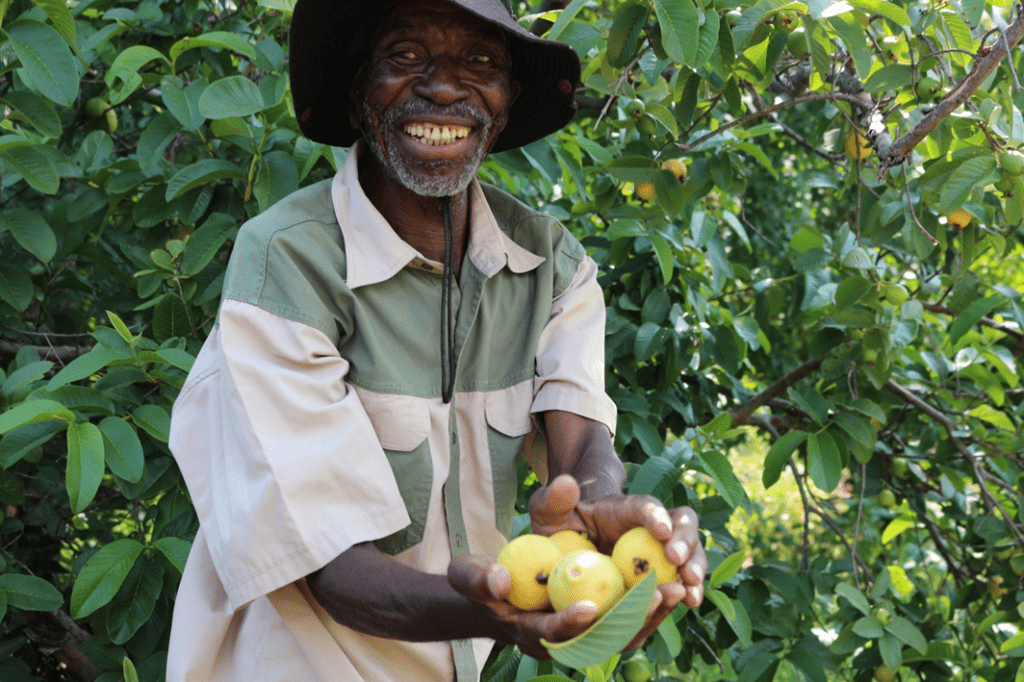
Ananias Moyo (78) is a community member within Sifanjani Village in Gwanda, Zimbabwe. He is married and stays with his wife, 2 grandchildren aged 20 and 18 and one great grandchild (2months).In 2007 Moyo was operated on after being diagnosed with a condition called twisted bowel. Twisted Bowel is a condition that occurs when one’s intestine twists around itself or twits around the tissue that holds it in place. After undergoing this surgery Moyo had a hard time carrying out duties such as fetching water and watering livestock as water sources were more than 5 kms from his homestead. Finding water became more cumbersome during the dry season when the river dried up as he had to herd his cattle and goats further downstream with hopes of getting water.
“The situation was bad around here, I had to either constantly dig 0.8m scoop wells or walk a distance of about 7km in search for water for my livestock. This started becoming a danger to my health as I usually experienced severe stomach pains afterwards”, Moyo said.
Moyo was amongst the many community members who put drums inside scoop wells as a way of harvesting and storing water for long term use. This was not the best of ideas as it not only compromised the lifespan of the river but also kindled disputes and animosity amongst the community members after livestock started drowning in the drums.



Moyo recalls one incident when one of the community members’ cow fell into a drum that he had inserted and the owner demanded payment for the damage at a time when Moyo had no money to spare or savings set aside for any emergencies.
Moyo recounted the story saying, “The owner of the cow was so furious and would not take any stories. He simply wanted payment in money and nothing else. I had to slaughter a cow and sell the meat cheaply before it went bad. The money from the sale was not enough to cover what was wanted. I was forced to get a loan from a loan shark to top up on what I had received from the sales”.
According to Moyo, water shortages were amongst the major reasons for squabbles within the Sifanjani community. When Dabane Trust came along people were first hesitant to work together towards an outcome that they had never seen as there was underlying animosity among some community members, most of which had been brewed by water shortage disputes.
“Everyone was excited about having water and people were ready to work “said Moyo.
Following the construction of the dam, Ananias set up a 0,2ha fruit and vegetable garden 80m from the river bank on which the sand dam lies where he currently grows vegetables such as Choumolier, onions, tomatoes, rape, beetroot among others. Moyo has since been growing these vegetables for both household consumption and selling. In October 2021 Moyo received an approximated total of R2000 (South African Rands) from selling onions and other vegetables that he had harvested from his garden.
“My two grandchildren would go and sell my garden produce at a place called Tuli, they would go there with a lot vegetables and fruits then come back with the money that they would have earned. I used most of this money to buy December groceries in preparation for the Christmas celebrations and to pay for one’s of my grandchildren’s hospital bills as she had just given birth and had been admitted at the hospital ”,said Moyo.


Moyo currently draws water for his livestock and his family from one of the Rowa pumps that were installed during the construction of the Nathi Sand Dam. The pump is located 1km from his homestead. Walking for a kilometer has immensely helped to improve Moyo’s health as he no longer encounters the excruciating stomach pains that were triggered by travelling for 7 kilometers whilst carrying heavy buckets of water.
“I have never been more grateful for what Dabane Trust have done. Our community has gotten more than just water from this project. It has significantly helped me improve my health”.
